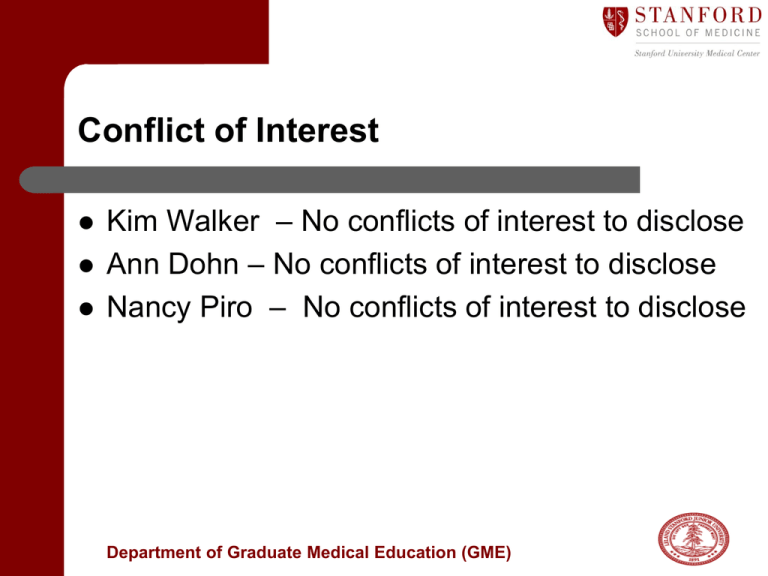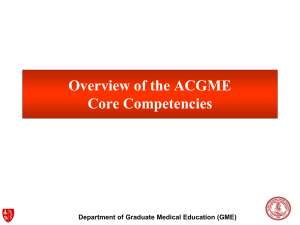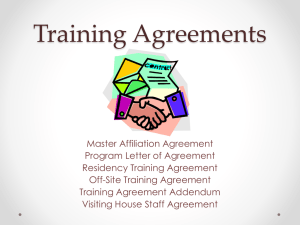Coordinators and Clinical Competency Committees: How to
advertisement

Conflict of Interest Kim Walker – No conflicts of interest to disclose Ann Dohn – No conflicts of interest to disclose Nancy Piro – No conflicts of interest to disclose Department of Graduate Medical Education (GME) PC002c Coordinators and Clinical Competency Committees: How to Streamline and Support the Work of your Program’s CCC Kim Walker, PhD Program Manager/Education Specialist Ann Dohn, MA DIO & GME Director Nancy Piro, PhD Program Manager/Education Specialist Session Outcomes Participants will be able to: Identify new aspects of the coordinators’ evolving role in program administration. Understand and use program requirements as a guide for planning, organizing and implementing educational and assessment tools. Develop and utilize a newly developed comprehensive resident performance profile tool to streamline the work of the CCCs. Department of Graduate Medical Education (GME) New Role Department of Graduate Medical Education (GME) Evolving Role for Coordinators in Evaluations Education & Evaluation Coordinator/Manager Administrator Scheduler Supreme • Deliver evaluations • Develop evaluation forms for PDs to approve • Schedule semi annual evaluations • Ensure summative evaluations completed and filed Extraordinaire • Constructing new milestone evaluations to pilot/deliver • Reviewing evaluation completion data for accuracy • Aggregating data for the CCC from multiple sources and forms • Milestone data to ACGME Department of Graduate Medical Education (GME) Now I’m really confused! Outcomes Evaluations CCCs EPAs Milestones Goals and Objectives Department of Graduate Medical Education (GME) Where do I begin? Department of Graduate Medical Education (GME) Know the NAS Building Blocks: Concepts defined NAS Core Competencies – – – Milestones EPAs Curriculum and Evaluations Clinical Competency Committee (CCC) Department of Graduate Medical Education (GME) NAS – Next Accreditation System What is NAS – in a nutshell: “an outcomes-based accreditation process through which the doctors of tomorrow will be measured for their competency in performing the essential tasks necessary for clinical practice in the 21st century.” http://www.acgme.org/acgmeweb/tabid/435/ProgramandInstitutionalAccred itation/NextAccreditationSystem.aspx Department of Graduate Medical Education (GME) Major Changes: Accreditation based on… Pre-NAS – – – – – – Competencies Site Visits – Up to 5+ year cycles Internal Reviews ADS Updates PIFs Resident Surveys Current (New) NAS – – – – – Competencies with Milestones Self-Studies at ~ 8-10 year intervals Detailed ADS Updates CLER Visits ~ 18 – 24 months (Institution) Resident & Faculty Surveys Department of Graduate Medical Education (GME) The New Accreditation System (NAS)… Outcomes Increased Annual reporting by Programs (online) Reduced volume of accreditation demands … but increased attention to accuracy and completeness of information submitted online PIF-less Surveyor visits (unless new application) – Two Field Surveyors per visit No Faculty CVs (only PD)….but Faculty & Resident Scholarly Activity required. Department of Graduate Medical Education (GME) The Six AGME Core Competencies Medical Knowledge Practicebased Learning & Improvement Patient Care Six Core Competencies For Quality Patient Care Systems-based Practice Department of Graduate Medical Education (GME) Interpersonal & Communication Skills Professionalism What Are Milestones? High Level - Milestones are simply defined as areas of competency/expectations for our trainees Linked to six core competencies Defined as a continuum of progressive growth/learning Department of Graduate Medical Education (GME) Dreyfus Model (1980): Stages of developing expertise * Rigid adherence to taught rules or plans * Little situational perception * No discretionary judgment 1 Novice 2 Advanced Beginner * Guidelines for action based on attributes or aspects * Situational perception still limited * All attributes and aspects are treated appropriately and given equal importance 4 Proficient * * * * * * * * * Coping with 'crowdedness' Now sees actions at least partly in terms of longer-term goals Conscious deliberate planning Standardized and routinized procedures Sees situations holistically rather than in terms of aspects See what is most important in a situation Perceives deviations from the normal patterns Decision-making less labored Uses maxims for guidance, whose meaning varies according to the situation 5 Expert * * * * No longer relies on rules, guidelines or maxims Intuitive grasp of situations based on deep tacit understanding Analytic approaches used only in novel situations or when problems occur Vision of what is possible 3 Competent Department of Graduate Medical Education (GME) Source: Eraut, M. Developing Professional Knowledge and Competencies. (1994) Milestone Level Definitions Level 1: The resident is a graduating medical student/experiencing first day of residency. Level 2: The resident is advancing and demonstrating additional milestones. Level 3: The resident continues to advance and demonstrate additional milestones; the resident consistently demonstrates the majority of milestones targeted for residency. Department of Graduate Medical Education (GME) Milestone Level Definitions (continued) Level 4: Level 5: The resident has advanced beyond The resident has advanced so that he or she now substantially demonstrates the milestones targeted for residency. This level is designed as the graduation target – not requirement. performance targets set for residency and is demonstrating “aspirational” goals which might describe the performance of someone who has been in practice for several years. It is expected that only a few exceptional residents will reach this level. Department of Graduate Medical Education (GME) Reporting the Milestones V.A.1.b).(1).(b) prepare and assure the reporting of Milestones evaluations of each (Core) resident semi-annually to ACGME Milestones are reported directly through ADS Reporting windows are: – – November 1- December 31 May 1- June 15 Department of Graduate Medical Education (GME) Entrustable Professional Activities (EPA) Professional life activities that define a medical specialty: – – – Ground the competencies in a physician’s everyday work Activities lead to some outcome that can be observed Complexity of the activities requires an integration of knowledge, skills and attitudes across competency domains Department of Graduate Medical Education (GME) Examples of EPAs Facilitate handovers to another healthcare provider either within or across settings Contribute to the scholarly work of the subspecialty Co-manage patients with generalists and other subspecialists Source: https://www.abp.org/abpwebsite/taskforce/reslib/24.ppt Department of Graduate Medical Education (GME) Curriculum: Rotation-specific goals and objectives & links to milestones Department of Graduate Medical Education (GME) Milestones Impact on Evaluations: Linking questions to milestones Step Two: Ensure specific Advises the referring health care provider(s)evaluation about the appropriateness of a procedure in routine clinical situations questions are linked to milestones Department of Graduate Medical Education (GME) Milestones Impact on Evaluation System Allows for more objective methods of assessment and provide better feedback Provides a process for early identification of residents that are having difficulties All old and new evaluations and questions should be aligned with and tracked to milestones Department of Graduate Medical Education (GME) Clinical Competency Committee (CCC) V.A.1. The program director must appoint the Clinical Competency Committee.(Core) V.A.1.a) At a minimum the Clinical Competency Committee must be composed of three members of the program faculty.(Core) V.A.1.a).(1) Others eligible for appointment to the committee include faculty from other programs and nonphysician members of the health care team.(Detail) ACGME Common Program Requirements Approved: February 7, 2012; Effective: July 1, 2013 Approved focused revision: June 9, 2013; Effective: July 1, 2013 Department of Graduate Medical Education (GME) Clinical Competency Committee (CCC) V.A.1.b).(1) The Clinical Competency Committee should: V.A.1.b).(1).(a) review all resident evaluations semiannually; (Core) V.A.1.b).(1).(b) prepare and assure the reporting of Milestones evaluations of each resident semi-annually to ACGME; and, (Core) V.A.1.b).(1).(c) advise the program director regarding resident progress, including promotion, remediation, and dismissal.(Detail) Department of Graduate Medical Education (GME) Clinical Competency Committee (CCC) V.A.1.b) There must be a written description of the responsibilities of the Clinical Competency (Core) Committee. ACGME Common Program Requirements Approved: February 7, 2012; Effective: July 1, 2013 Approved focused revision: June 9, 2013; Effective: July 1, 2013 Department of Graduate Medical Education (GME) Clinical Competency Committee (CCC): Written description Department of Graduate Medical Education (GME) Clinical Competency Committee (CCC) How the CCC does its work can be decided by the Program Director – – – – Subcommittees Assigning residents to faculty members for pre-review Pre-review work will vary Scheduling and frequency of meetings Department of Graduate Medical Education (GME) What Should a CCC Do First? Understand their specialty Milestones (Posted on acgme.org) Decide how to assess the Milestones – Program Evaluation Strategy If necessary, identify new evaluation tools from program director associations, societies, colleges Department of Graduate Medical Education (GME) NAS and Milestones and YOU The program coordinator will play a crucial role in developing, implementing, collecting data on and reporting of milestone evaluation tools. Department of Graduate Medical Education (GME) Managing it all… Department of Graduate Medical Education (GME) U - R - IT! 1. 2. Understanding RRC program requirements Requirements applied to evaluation methods/process 3. 4. Implementing new evaluation system Tracking completion and accuracy (outliers) for data aggregation Department of Graduate Medical Education (GME) 1. Understand Your Program’s New Requirements Core Outcomes Details Department of Graduate Medical Education (GME) 1. Understand Your Program’s New Requirements Each standard/requirement is categorized: Outcome - All programs must adhere Core - All programs must adhere Detail – Considered mandatory for new programs and those that fail to meet core requirements. Allows high-performing programs to innovate. Source: Implementing The Next Accreditation System ACGME Webinar John R. Potts, III, M.D.: 4 November 2013 Department of Graduate Medical Education (GME) 1. Understand Your Program’s New Requirements Example Program Requirement: VI.B. Transitions of Care (Core) (Core) (Outcome) Department of Graduate Medical Education (GME) 1. Understand Your Program’s New Requirements Example Program Requirement: VI.B. Transitions of Care When core and outcome not in compliance, then: Details Department of Graduate Medical Education (GME) U - R - IT! 1. 2. Understanding RRC program requirements Requirements applied to evaluation methods/process – – 3. 4. Linking milestones/EPAs and objectives to evaluation questions Utilizing milestone scales Implementing new evaluation system Tracking completion and accuracy (outliers) for data aggregation Department of Graduate Medical Education (GME) 2. Requirements Specific to CCC Review of Trainee Aggregating/compiling multiple evaluations of individual trainees (V.A.1. Formative Evaluation) Tracking trainee participation in conferences, journal clubs, didactics (IV.A.3. Didactic Sessions) Monitoring duty hour compliance (VI.G. Duty Hours) Reviewing involvement in quality improvement and patient safety activities (IV.A.5.c. PBLI) Reviewing scholarly work (IV.B. Scholarly Work) Monitoring and reporting procedure logs (IV.A.5.a) Department of Graduate Medical Education (GME) U - R - IT! 1. 2. Understanding RRC program requirements Requirements applied to evaluation methods/process – – 3. 4. Linking milestones/EPAs and objectives to evaluation questions Utilizing milestone scales Implementing new evaluation system Tracking completion and accuracy (outliers) for data aggregation Department of Graduate Medical Education (GME) 3. Implementing Evaluation systems – – – – – Milestone-based/EPAs Rotation-specific Patient handovers Define evaluator groups (faculty, staff, patients) Set up and timing of delivery systems Department of Graduate Medical Education (GME) 3. Implementing Documentation and reporting systems for: – – – – – Conference attendance Scholarly work (Learning Portfolios) Quality Improvement and Patient Safety (Learning Portfolios / Safety reporting systems) Duty Hours (recording, monitoring, reporting) Case Logging (if applicable) Department of Graduate Medical Education (GME) U - R - IT! 1. 2. Understanding RRC program requirements Requirements applied to evaluation methods/process – – 3. 4. Linking milestones/EPAs and objectives to evaluation questions Utilizing milestone scales Implementing new evaluation system Tracking completion and accuracy (outliers) for data aggregation Department of Graduate Medical Education (GME) 4. Tracking and Reporting… Start with the end in mind: – CCC biannual reporting windows to ACGME November 1- December 31 / May 1 - June 15 Back track and set calendar events for: – – – Periodic monitoring of evaluation completion Running aggregate reports and reviewing milestone evaluation data Reviewing case logs, learning portfolios, duty hours Department of Graduate Medical Education (GME) Pulling the Data Together End-ofRotation Evaluations Clinical Skills Assessment Nursing and Staff / Techs Evaluations Quality Improvement Activities Sim Lab Clinical Competency Committee Progress on Milestones Department of Graduate Medical Education (GME) In-service training exams Safety Incident Reports Case Logs Patient/ Family Evaluations Managing it all: How will I pull this off? Department of Graduate Medical Education (GME) The Toolbox Department of Graduate Medical Education (GME) Creating a Resident Performance Profile Goals to support your CCC Resident performance data that is: Comprehensive Consolidated / Aggregated Easy for CCC to identify strengths, areas for improvement, opportunities for advancement Department of Graduate Medical Education (GME) Creating a Resident Performance Profile: Compiling and centralizing data Department of Graduate Medical Education (GME) Creating a Resident Performance Profile: Apply visual formatting for trends Department of Graduate Medical Education (GME) Creating a Resident Performance Profile Step 1 – Defining what to track Evaluations Milestone End of Rotation (Total) Medical Knowledge Patient Care Interpersonal & Communication Skills Professionalism Systems-Based Practice Practice-Based Learning & Improvement Department of Graduate Medical Education (GME) Creating a Resident Performance Profile Step 1 – Defining what to track In-service Assessments (MK; PC) Routine procedure technical skills assessment: Level 2-3 Complex procedure technical skills assessment: Level 3-4 Medical Knowledge Assessments Department of Graduate Medical Education (GME) Creating a Resident Performance Profile Step 1 – Defining what to track Case Logs / Clinical Experience (PC) VAGINAL DELIVERY CAESAREAN SECTION PEDIATRICS PEDIATRICS UNDER 3 CARDIAC ENDOVASCULAR Department of Graduate Medical Education (GME) Creating a Resident Performance Profile Step 1 – Defining what to track Quality Improvement/Patient Safety QI Project QI Committee Participation QI Course Work (e.g., IHI) SAFE Report / Adverse Event Review Patient Handover Evaluations Department of Graduate Medical Education (GME) Creating a Resident Performance Profile Step 1 – Defining what to track Practice-Based Learning Patient outcomes / Case Study Presentation Scholarly Activity: Research study Scholarly Activity: Publications Presentation(s) at Internal/National Meetings Department of Graduate Medical Education (GME) Creating a Resident Performance Profile Step 1 – Defining what to track Interpersonal and Communication Skills Patient Feedback Staff Evaluation Medical Student Feedback Patient Handover Evaluations Department of Graduate Medical Education (GME) Creating a Resident Performance Profile Step 2 - Link data sources to milestones Evaluations Milestone End of Rotation (Total) Medical Knowledge Patient Care Communication Professionalism Systems-based Practice Practice-based Learning Quality Improvement/Patient Safety QI Project QI Committee Participation QI Course Work (e.g., IHI) SAFE Report / Adverse Event Review Patient Handover Evaluations Department of Graduate Medical Education (GME) Milestones 24 MK A1 PC A1-10 ICS A1-2 PROF 1-5 SBP A1-2 PBLI A1-4 PBLI1-2 PBLI1-2 PBLI1-2 PROF1/2; SBP1 SBP1; ICS1 Creating a Resident Performance Profile Step 3: CCC defines performance ranges Example: For all aggregate milestone evaluation scores for a PGY 3, the CCC has defined these ranges by PGY level in advance of the meeting: At or Above Expectation: Below Expectation: Remediation: Below 1.7 1.7 – 2.7 2.8 and higher STRENGTH WATCH Department of Graduate Medical Education (GME) AT RISK Creating a Resident Performance Profile Step 4 – Set conditional formatting Department of Graduate Medical Education (GME) Creating a Resident Performance Profile Step 4 – Set conditional formatting Example: Aggregate milestone evaluation data cells Highlight cells to apply the conditional formatting Department of Graduate Medical Education (GME) Creating a Resident Performance Profile Step 4 – Set conditional formatting Set Ranges: > , < , between Department of Graduate Medical Education (GME) Creating a Resident Performance Profile Step 4 – Set conditional formatting Select, “Greater Than” “Less Than” or “Between” to Set Value Ranges Choose the corresponding fill color (e.g., red, yellow, green) Department of Graduate Medical Education (GME) Resident Performance Profile: Step 5: Enter in data Department of Graduate Medical Education (GME) Creating a Resident Performance Profile Visual trends and detailed data Department of Graduate Medical Education (GME) More tools… Department of Graduate Medical Education (GME) Leveraging Resident Management System (RMS)Tools, if Available RMSs – becoming more feature rich Curriculum – – Goals and Objectives and learning outcomes by rotation Teaching and Assessment methodologies Evaluation tool development – Sharing between programs and institutions Department of Graduate Medical Education (GME) Leveraging Resident Management System (RMS)Tools, if Available Conference attendance statistics – – Core competencies linked to specified conferences Attaching conference materials for later reference Procedures and levels; linked procedure evaluations Department of Graduate Medical Education (GME) Leveraging Resident Management System (RMS)Tools, if Available • Resident portfolio tools QI participation and outcomes Scholarly Activity logs Department of Graduate Medical Education (GME) Leveraging Resident Management System (RMS)Tools, if Available Aggregate reporting and graphic summaries Peer or departmental average, individual average, minimum and maximum scores, standard deviation or listing of all scores Department of Graduate Medical Education (GME) Leveraging Calendaring and Task Management Software Set “data gathering and reporting” appointments with yourself Remember to start with the end in mind (e.g., CCC meeting dates) Break down large tasks into smaller tasks to keep it manageable Department of Graduate Medical Education (GME) Leveraging Calendaring and Task Management Software Department of Graduate Medical Education (GME) Learning through Experience Department of Graduate Medical Education (GME) When a CCC Meeting… Doesn’t go well Data – – – not complete not organized not accurate Does go well Data – – – complete organized accurate PD or faculty member Cooperative, dominates meeting collaborative decision Prolonged inefficient making decision making with Efficient use of time inability to gain consensus Sound valid conclusions Unsubstantiated/unreliable aligned with data conclusions Department of Graduate Medical Education (GME) 4 P P G Y 3 P G Y 2 Y P G Thetical, Hypo G Y 1 Successful Resident Ranking PGY1- 4: Ready to graduate 6/30/08 6/30/09 6/30/10 6/30/11 MK A1-6 PC A1-10 1.5 1.3 1.4 2.3 1.9 2.0 3.1 3.1 2.9 3.9 3.6 4.0 ICS A1-2 1.1 2.3 2.9 3.9 PROF 1-3 2.1 2.8 3.5 4.2 Systems-based Practice SBP A1-2 1.3 2.0 Practice-based Learning & Improvement PBLI A1-2 1.5 2.8 Department of Graduate Medical Education (GME) 3.0 4.1 3.2 3.8 Date Completed Evaluations Milestone End of Rotation (Total) Medical Knowledge Patient Care Interpersonal Communication Skills Professionalism Milestones 25 PGY 1 Ranked at Graduation Level 1 Milestone range for a PGY1 should not be a 4.0, 4.5 or 5.0 … Department of Graduate Medical Education (GME) 4 P G Y 3 P G Y 2 Y P Professionalism P Date Completed Evaluations Milestone End of Rotation (Total) Medical Knowledge Patient Care Interpersonal Communication Skills G Thetical, Hypo G Y 1 Improvement evident 6/30/08 6/30/09 6/30/10 6/30/11 MK A1-6 PC A1-10 0.9 0.8 0.9 1.5 1.9 0.9 2.7 2.6 2.9 4.0 4.0 4.2 ICS A1-2 0.7 0.8 2.7 4.2 PROF 1-3 0.9 0.5 2.0 3.9 2.0 3.0 4.1 2.8 3.2 3.8 Milestones 25 Systems-based Practice SBP A1-2 1.0 Practice-based Learning & Improvement PBLI A1-2 1.1 Department of Graduate Medical Education (GME) We Should not be at this Point Department of Graduate Medical Education (GME) Beyond data…Creating a climate of CCC Success Gentle Words of Wisdom Tight efficient meetings Ground Rules Beware of Negative Group Think Schedule firm standing meeting dates in advance Reserve room of appropriate size with required audio-visual tools if needed …..and have snacks Department of Graduate Medical Education (GME) Use Technology to Your Advantage… You can be a ‘Rock Star’ Department of Graduate Medical Education (GME) Session Recap in a Nutshell… Know your program requirements and follow them unconditionally Use simple spreadsheet, calendaring and task organizational tools to manage, track and present resident performance data to your CCC Resident education is a cyclical process – revisit and revise tools and processes each year Department of Graduate Medical Education (GME) Questions Department of Graduate Medical Education (GME) Contacts Kim Walker - kwalker5@stanford.edu Ann Dohn - adohn1@stanford.edu Nancy Piro - npiro@stanford.edu Department of Graduate Medical Education (GME)





